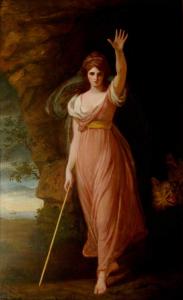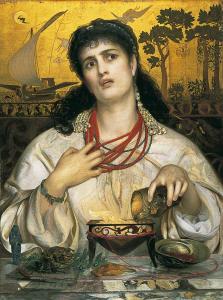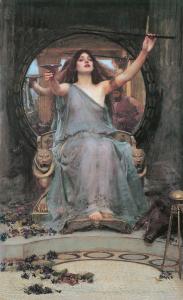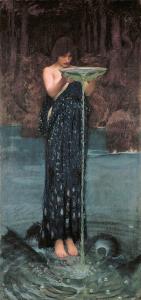Biography of Circe
 Around 1782 George Romney (age 47). Portrait of Amy "Emma Hart Lady Hamilton" Lyon (age 16) as Circe.
Around 1782 George Romney (age 47). Portrait of Amy "Emma Hart Lady Hamilton" Lyon (age 16) as Circe.
 Around 1782 George Romney (age 47). Portrait of Amy "Emma Hart Lady Hamilton" Lyon (age 16) as Circe.
Around 1782 George Romney (age 47). Portrait of Amy "Emma Hart Lady Hamilton" Lyon (age 16) as Circe.
 1868. Frederick Sandys (age 38). "Medea". From Wikipeadia: In Greek mythology, Medea is the daughter of King Aeëtes of Colchis, a niece of Circe and the granddaughter of the sun god Helios. Medea figures in the myth of Jason and the Argonauts, appearing in Hesiod's Theogony around 700 BC, but best known from Euripides's tragedy Medea and Apollonius of Rhodes' epic Argonautica. Medea is known in most stories as a sorceress and is often depicted as a priestess of the goddess Hecate. The model was Keomi aka Keytumas Gray (age 26).
1868. Frederick Sandys (age 38). "Medea". From Wikipeadia: In Greek mythology, Medea is the daughter of King Aeëtes of Colchis, a niece of Circe and the granddaughter of the sun god Helios. Medea figures in the myth of Jason and the Argonauts, appearing in Hesiod's Theogony around 700 BC, but best known from Euripides's tragedy Medea and Apollonius of Rhodes' epic Argonautica. Medea is known in most stories as a sorceress and is often depicted as a priestess of the goddess Hecate. The model was Keomi aka Keytumas Gray (age 26).
 1891. John William Waterhouse (age 41). "Circe Offering the Cup to Ulysses".
1891. John William Waterhouse (age 41). "Circe Offering the Cup to Ulysses".
Ulysses: Metamorphoses Book 14 Lines 40-67. The lover Glaucus wept. He fled the embrace of Circe and her hostile power of herbs and magic spells. But Scylla did not leave the place of her disaster; and, as soon as she had opportunity, for hate of Circe, she robbed Ulysses of his men. She would have wrecked the Trojan ships, if she had not been changed beforehand to a rock which to this day reveals a craggy rim. And even the rock awakes the sailors' dread.
 1892. John William Waterhouse (age 42). "Circe Invidiosa" aka Circe Jealous.
1892. John William Waterhouse (age 42). "Circe Invidiosa" aka Circe Jealous.
Metamorphoses Book 14 Lines 1-24. Now the Euboean dweller in great waves, Glaucus, had left behind the crest of Aetna, raised upward from a giant's head; and left the Cyclops' fields, that never had been torn by harrow or by plough and never were indebted to the toil of oxen yoked; left Zancle, also, and the opposite walls of Rhegium, and the sea, abundant cause of shipwreck, which confined with double shores bounds the Ausonian and Sicilian lands. All these behind him, Glaucus, swimming on with his huge hands through those Tyrrhenian seas, drew near the hills so rich in magic herbs and halls of Circe, daughter of the Sun,-halls filled with men in guise of animals. After due salutations had been given-received by her as kindly-Glaucus said, "You as a goddess, certainly should have compassion upon me, a god; for you alone (if I am worthy of it) can relieve my passion. What the power of herbs can be, Titania, none knows more than I, for by their power I was myself transformed. To make the cause of my strange madness known, I have found Scylla on Italian shores, directly opposite Messenian walls. It shames me to recount my promises, entreaties, and caresses, and at last rejection of my suit. If you have known a power of incantation, I implore you now repeat that incantation here, with sacred lips-If herbs have greater power, use the tried power of herbs. But I would not request a cure-the healing of this wound. Much better than an end of pain, let her share, and feel with me my impassioned flame."
Metamorphoses Book 14 Lines 25-39. The goddess in her jealous rage could not and would not injure him, whom she still loved, but turned her wrath upon the one preferred. She bruised immediately the many herbs most infamous for horrid juices, which, when bruised, she mingled with most artful care and incantations given by Hecate. Then, clothed in azure vestments, she passed through her troop of fawning savage animals, and issued from the center of her hall. Pacing from there to Rhegium, opposite the dangerous rocks of Zancle, she at once entered the tossed waves boiling up with tides: on these as if she walked on the firm shore, she set her feet and, hastening on dry shod, she skimmed along the surface of the deep. Not far away there was an inlet curved, round as a bent bow, which was often used by Scylla as a favorite retreat. There, she withdrew from heat of sea and sky when in the zenith blazed the unclouded sun and cast the shortest shadows on the ground. Circe infected it before that hour, polluting it with monster-breeding drugs. She sprinkled juices over it, distilled from an obnoxious root, and thrice times nine she muttered over it with magic lips, her most mysterious charm involved in words of strangest import and of dubious thought. Scylla came there and waded in waist deep, then saw her loins defiled with barking shapes. Believing they could be no part of her, she ran and tried to drive them back and feared the boisterous canine jaws. But what she fled she carried with her. And, feeling for her thighs, her legs, and feet, she found Cerberian jaws instead. She rises from a rage of dogs, and shaggy backs encircle her shortened loins.
Metamorphoses Book 14 Lines 40-67. The lover Glaucus wept. He fled the embrace of Circe and her hostile power of herbs and magic spells. But Scylla did not leave the place of her disaster; and, as soon as she had opportunity, for hate of Circe, she robbed Ulysses of his men. She would have wrecked the Trojan ships, if she had not been changed beforehand to a rock which to this day reveals a craggy rim. And even the rock awakes the sailors' dread.